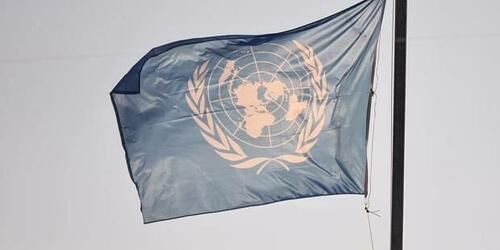Saudi Ex-Spymaster Pens Scathing Op-Ed On “Rethinking The Global Order”
With Saudi Arabia reportedly in discussions to join BRICS (Brazil, Russia, India and China), and President Biden set to meet with Crown Prince Mohammed bin Salman (MBS) – who he vowed to make “the pariah, that they are” during the 2020 elections over the killing of journalist Jamal Khashoggi – a July 4 Op-Ed by former Saudi spymaster Turki bin Faisal Al Saud over the current state of affairs may provide key insight at this particular moment in geopolitics.
In short, while fundamentally endorsing the UN’s globalist agenda, Al Saud argues that those leading the current international order have “failed to live up to the principles of good governance enshrined in the UN charter,” and that hypocritical world leaders “need to come to their senses” and reform “deeper structural problems” in order to adapt to the new, multipolar order pushed by Russia an dChina.
“Our organizing principles still reflect the mentality of the post-war and Cold War era,” he argues, citing a UN report that concluded major reforms were needed.
Authored by Turki bin Faisal Al Saud via Project Syndicate (emphasis ours),
For decades, it has been obvious that the UN system needs to be reformed to account for the realities of the twenty-first century. Yet recommendations to restructure global governance have been ignored by those with the power to carry them out, leaving us with a world of multiplying crises for which there are few solutions.
BAKU – Just as the world was beginning to recover from one of the biggest crises in recent decades, another one has erupted in Europe. Just as the COVID-19 pandemic underscored our common humanity, Russia’s war on Ukraine has reminded us of how fragile, interconnected, and interdependent our world is. As the Chinese say, “All is one under heaven.”
Intensifying great-power confrontations and deglobalization are jeopardizing world peace and security. New crises seem to be lurking around every corner, but appropriate solutions are nowhere to be seen – not in the Far East, South Asia, the Middle East and North Africa, Sub-Saharan Africa, Eastern Europe, or Latin America. The popular mood has darkened, reinvigorating populism, nationalism, Islamophobia, and other atavistic trends that threaten the progressive achievements humanity has made since World War II.
The Ukraine crisis itself is a symptom of deeper structural problems in the international order. That order, led by the permanent members of the United Nations Security Council (China, France, Russia, the United Kingdom, and the United States), has failed to live up to the principles of good governance enshrined in the UN Charter.
New global orders tend to emerge from major wars. In the case of WWII, the victors created structures designed to preserve international peace and security. But while our increasingly integrated world has changed dramatically since the UN’s founding, our organizing principles still reflect the mentality of the post-war and Cold War era. Within the current framework, a failure to respond to global challenges is a failure of the entire international community.
Can the system be reformed? Calls since the early 1990s to restructure the UN system – the avatar for the broader international order – have consistently fallen on deaf ears. Worse, Russia and China are now using their seats at the helm of the international order to push for a more multipolar system. Rather than working to reform the current framework, they are challenging its validity.
Humanity’s collective achievements over the past seven decades are a testament to why we must work together to make the UN system more fair, inclusive, and attentive to people’s needs and aspirations. Indeed, that was the mission of UN Secretary-General Kofi Annan’s High-Level Panel on Threats, Challenges, and Change in 2003.
Consisting of 16 eminent figures from different parts of the world, and chaired by former Thai Prime Minister Anand Panyarachun, the panel analyzed contemporary threats to international peace and security; evaluated how well existing policies and institutions had done in addressing those threats; and offered recommendations aimed at strengthening the UN and enabling it to provide collective security for the twenty-first century.
The panel’s final report made clear that all of the UN’s principal organs needed reform, including the Security Council, which the panel argued should be expanded. Unfortunately, the Security Council’s veto-wielding permanent members simply ignored the panel’s recommendations, setting the stage for today’s paralysis and dysfunction.
The Middle East is especially in need of a well-functioning, genuinely representative UN system. No region has suffered more from the unfair bipolar and unipolar dynamics of the past. We have been the altar on which the principles of the international order are routinely sacrificed. The same principles that led to the creation of the State of Israel also led to the Palestinians being deprived of their homeland and denied their basic rights to self-determination and statehood.
As the Middle East has gone from one war to another, from one catastrophe to another, and from one UN resolution to another, justice has continuously eluded it. Every time an Arab, Muslim, or Middle Eastern issue comes up, the hypocrisy of the great powers that lead the international order becomes crystal clear.
The leaders of those powers need to come to their senses. Reforming the existing order requires new thinking by all UN member states, including the Security Council’s five permanent members. The international order can preserve peace and security only to the extent that it is equitable and capable of meeting the challenges that humanity faces. Short of that, geopolitical upheavals will continue to threaten world peace and security.
* * *
His Royal Highness Turki bin Faisal al-Saud, Chairman of the King Faisal Center for Research and Islamic Studies, was the Director General of Al Mukhabarat Al A’amah, Saudi Arabia’s intelligence agency from 1977 to 2001, and has served as Saudi Arabia’s ambassador to the United Kingdom and the United States.
Tyler Durden
Mon, 07/04/2022 – 19:00

